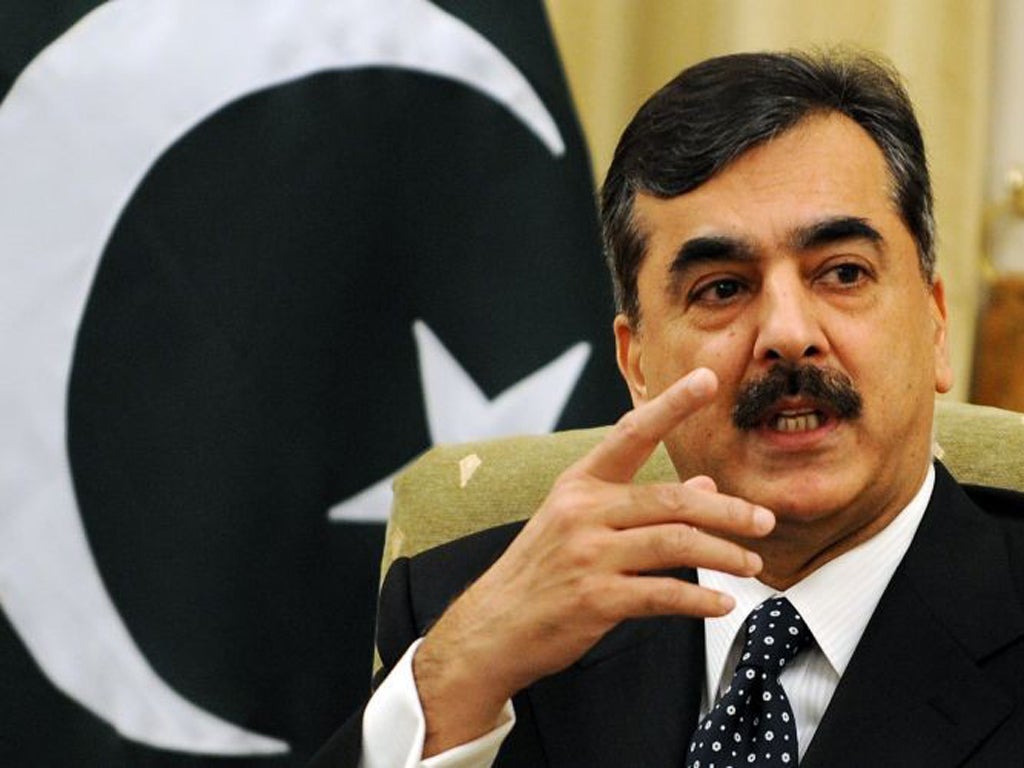Pakistan in turmoil as courts clash with PM
Generals look on as Supreme Court starts contempt proceedings against Gilani

Pakistan plunged deeper into crisis last night after the country's highest court began contempt proceedings against Prime Minister Yousaf Raza Gilani.
In the latest twist to the constitutional turmoil that has gripped the nation, the Supreme Court demanded that Mr Gilani appear later this week to explain why his government had failed to follow directives to reopen corruption investigations against the President. If convicted, he could be forced from office.
Last night, Mr Gilani said he would appear. During a compelling performance before parliament, he said: "We have always respected the courts. The court has called me and in respect to the court, I will go on January 19 and appear."
The government, headed by President Asif Ali Zardari, has found itself increasingly squeezed from the military on one side and an assertive judiciary on the other. While few believe a traditional coup is now likely, many believe Mr Gilani could be forced from office.
The target of the courts is less the Prime Minister than Mr Zardari. Headed by Chief Justice Iftikhar Chaudhry, a man with little time for Mr Zardari, the courts have repeatedly demanded the government ask Swiss authorities to reopen corruption cases against the President dating back to the 1990s. The government has declined to do so, claiming that in his position as President, Mr Zardari has immunity.
The courts say that since the nullifying of an ordinance passed when General Musharraf held office, Mr Zardari no longer enjoys such immunity.
At the same time, the government is locked in an increasingly bitter battle with the military. Last week, Mr Gilani accused the chief of the army, General Ashfaq Parvez Kayani, and the ISI head, Lt-Gen Ahmed Shuja Pasha, of acting unconstitutionally when they gave evidence to a judicial panel. The army angrily denounced Mr Gilani's comments and said they could have "potentially grievous consequences for the country". An increasingly emboldened Mr Gilani refused to withdraw his comments and sacked the Defence Secretary, a retired General.
Yesterday, Mr Gilani and the Pakistan People's Party (PPP) earned something of a boost when the government secured passage of a resolution tabled by one its coalition partners and voted on by the parliament. The resolution, in favour of democracy, was easily passed and the Prime Minister used the occasion to again portray himself and his party as the victims of underhand actions. "We need no certificate to prove our patriotism," he said. Pakistan's Ary News reported that at a meeting of coalition allies prior to the vote, Mr Gilani had offered to stand down but it was decided he should appear in court.
Many believe the army is happy to sit back and allow the courts to take on the government. "What we are seeing is not so much a steep learning curve in the difficult transition to democracy as the ugly face of the politics of brinkmanship in Pakistan for which the chief culprit – as ever – is the army," Farzana Shaikh, a Pakistan expert at Chatham House in London, said.
Raza Rumi, a Pakistani columnist, said: "Gilani has announced that he is not stepping down... the PPP has decided to fight it out and will appear before the court. There is a history between the PPP and the judiciary as an institution and the PPP wants to leverage this court case to rebuild its image as the 'victim' party."
The army's fued with the government relates to the so-called "memogate" affair – a secret note was allegedly sent to the US military by Mr Zardari last spring seeking help in reining in his own generals. The military demanded an investigation into the matter, and it was to that panel that the army and spy chiefs gave their statements.
Yesterday, a judicial panel reopened its investigation. Mansoor Ijaz, a Pakistani-American businessman who claimed he was the government's envoy to the Pentagon, was due to appear.
Blackberry maker refuses to give up data linked to 'memogate' affair
The BlackBerry maker Research in Motion (RIM) has earned itself a cameo role in Pakistan's political crisis following reports that it had refused to hand over data linked to the "memogate" scandal that led to resignation of the country's envoy to the US and opened a rift in the government's relationship with the military.
The company is said to have turned down the request from Pakistan's Attorney General, citing privacy grounds. Yesterday, RIM said that, while it would not speculate on individual cases, when it came it came to requests from legal authorities, it was "guided by appropriate legal processes" and principles as it balanced "any such requests against our priority of maintaining the privacy rights of our users".
Join our commenting forum
Join thought-provoking conversations, follow other Independent readers and see their replies
Comments
Bookmark popover
Removed from bookmarks